人教新目标中考英语复习-- 形容词和副词(共有PPT93张)
文档属性
| 名称 | 人教新目标中考英语复习-- 形容词和副词(共有PPT93张) | 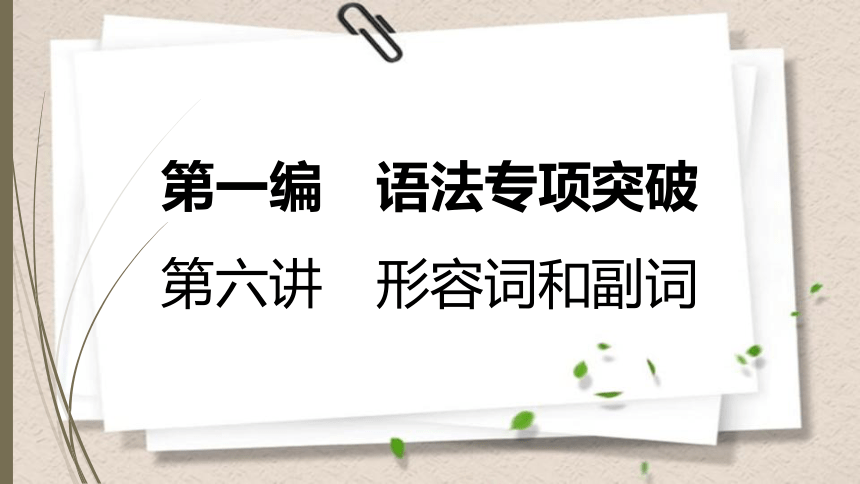 | |
| 格式 | pptx | ||
| 文件大小 | 3.3MB | ||
| 资源类型 | 教案 | ||
| 版本资源 | 通用版 | ||
| 科目 | 英语 | ||
| 更新时间 | 2022-02-12 17:02:04 | ||
图片预览

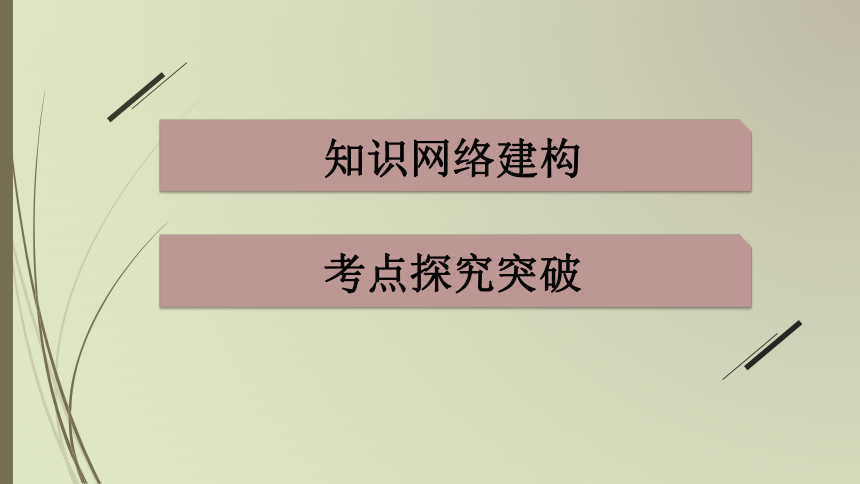

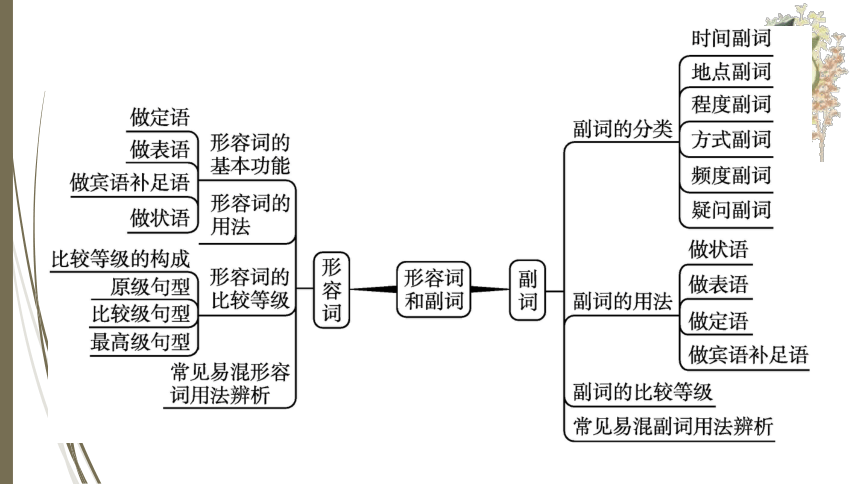

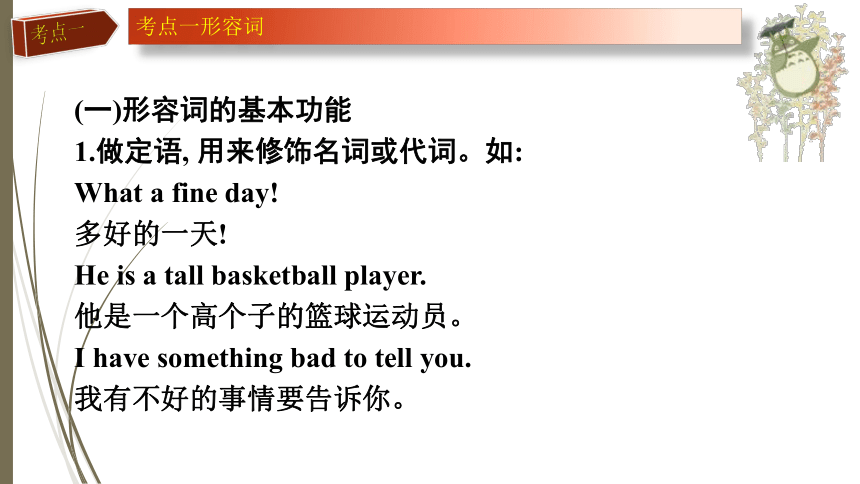
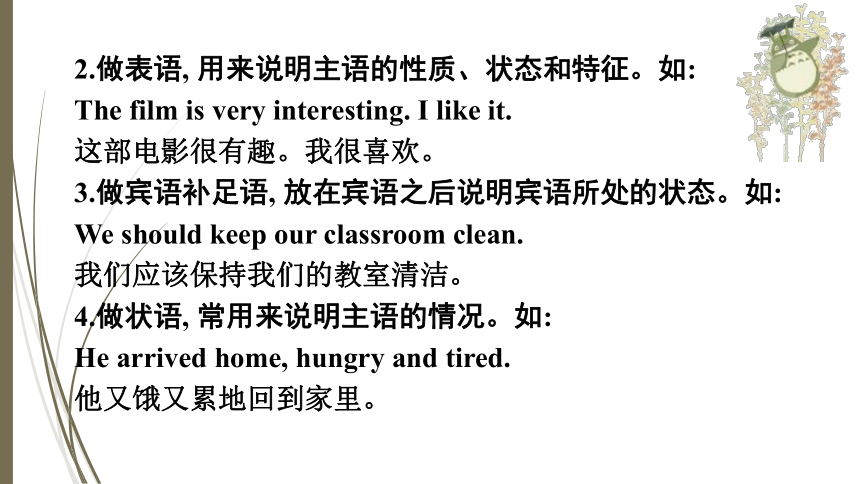
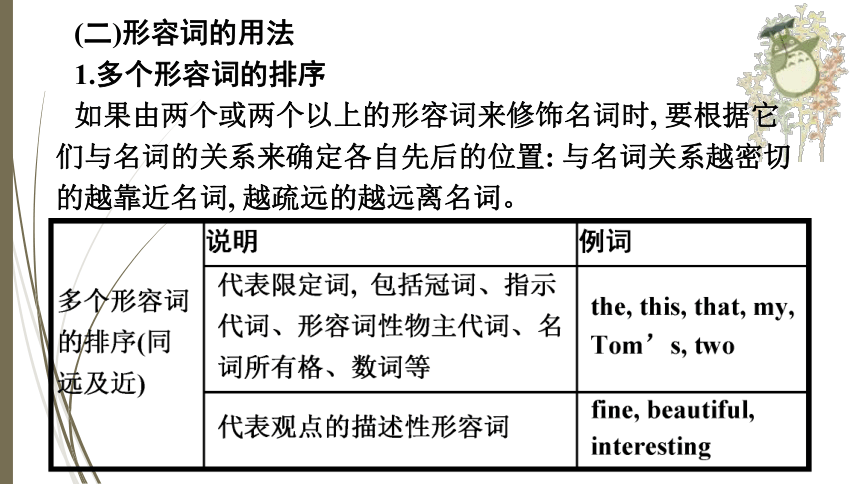
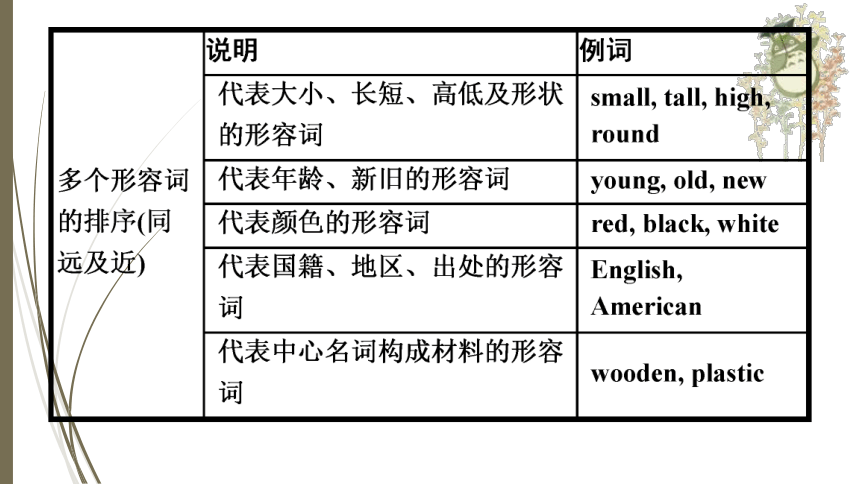
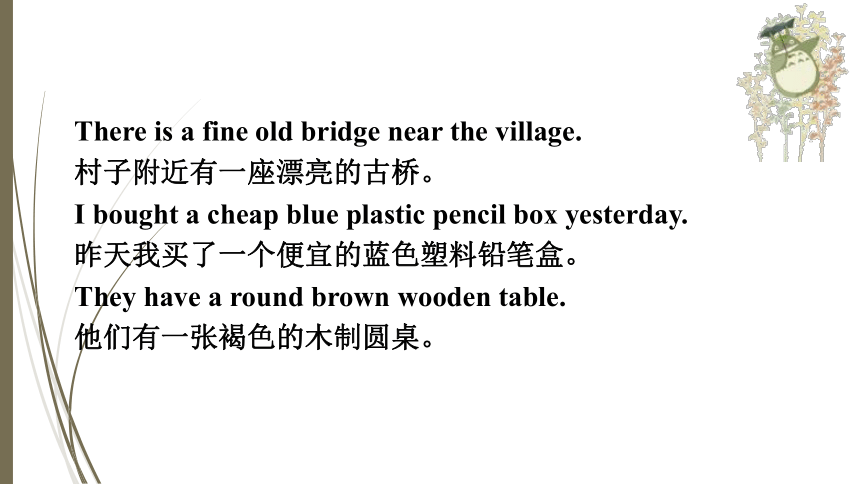
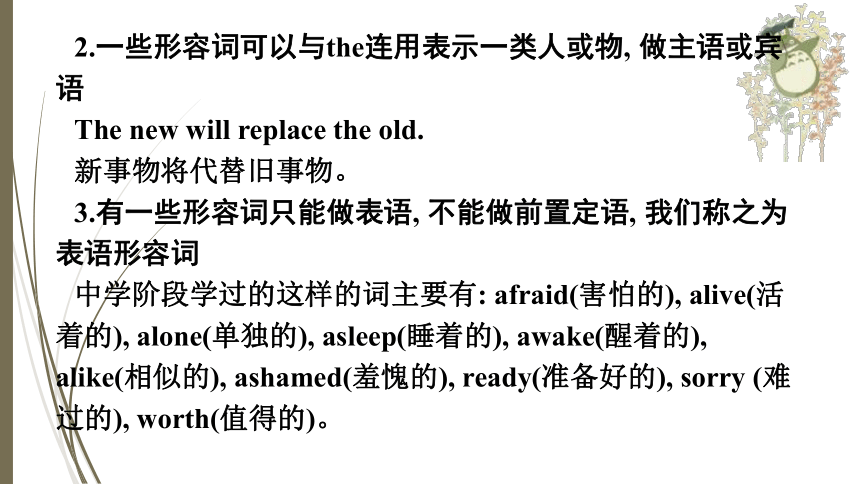
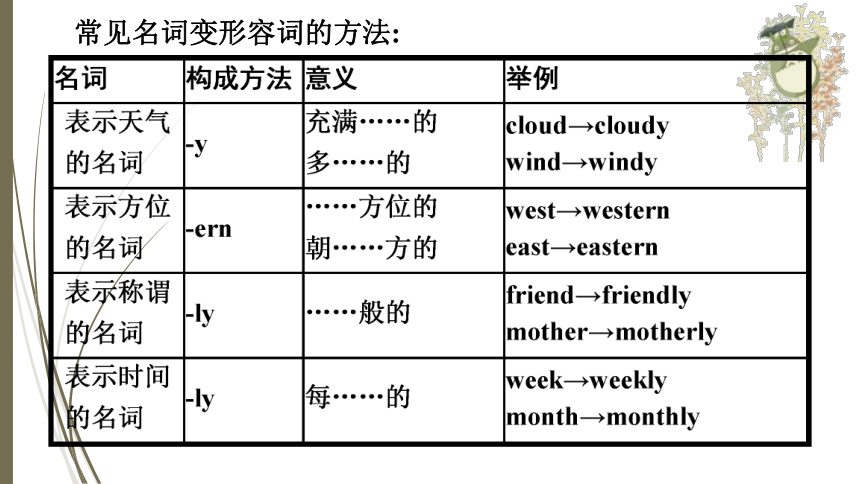
文档简介
(共93张PPT)
第一编 语法专项突破
第六讲 形容词和副词
知识网络建构
考点探究突破
知识网络建构
考点一
考点二
考点探究突破
考点一
考点一形容词
(一)形容词的基本功能
1.做定语, 用来修饰名词或代词。如:
What a fine day!
多好的一天!
He is a tall basketball player.
他是一个高个子的篮球运动员。
I have something bad to tell you.
我有不好的事情要告诉你。
2.做表语, 用来说明主语的性质、状态和特征。如:
The film is very interesting. I like it.
这部电影很有趣。我很喜欢。
3.做宾语补足语, 放在宾语之后说明宾语所处的状态。如:
We should keep our classroom clean.
我们应该保持我们的教室清洁。
4.做状语, 常用来说明主语的情况。如:
He arrived home, hungry and tired.
他又饿又累地回到家里。
(二)形容词的用法
1.多个形容词的排序
如果由两个或两个以上的形容词来修饰名词时, 要根据它们与名词的关系来确定各自先后的位置: 与名词关系越密切的越靠近名词, 越疏远的越远离名词。
There is a fine old bridge near the village.
村子附近有一座漂亮的古桥。
I bought a cheap blue plastic pencil box yesterday.
昨天我买了一个便宜的蓝色塑料铅笔盒。
They have a round brown wooden table.
他们有一张褐色的木制圆桌。
2.一些形容词可以与the连用表示一类人或物, 做主语或宾语
The new will replace the old.
新事物将代替旧事物。
3.有一些形容词只能做表语, 不能做前置定语, 我们称之为表语形容词
中学阶段学过的这样的词主要有: afraid(害怕的), alive(活着的), alone(单独的), asleep(睡着的), awake(醒着的), alike(相似的), ashamed(羞愧的), ready(准备好的), sorry (难过的), worth(值得的)。
常见名词变形容词的方法:
典例1Sam is about his speech because he thinks he is well prepared.
A.honest B.confident
C.modest D.curious
解析:句意: 萨姆对他的演讲很有信心, 因为他认为他准备好了。be confident about“对……有信心”。故选B项。
答案:B
活学活用
(三)形容词的比较等级
1.形容词比较等级的构成
(1)规则变化
(2)不规则变化
2.原级句型
3.比较级句型
4.最高级句型
典例2He is a little than you, but he is as as you.
A.thin; stronger B.thinner; stronger
C.thinner; strong D.thin; strong
解析:由than可知用比较级; as... as“和……一样”, 中间用形容词或副词的原级。故选C项。
答案:C
活学活用
(四)常见易混形容词用法辨析
1.interesting和interested
规律总结一般来说, 表示心理状态的动词如excite, interest等都是及物动词, 意思分别是“使激动”“使感兴趣”。这类动词的-ing形式常用来描述事物的性质或特征, 意为“令人……的”; 其-ed形式通常表示人的心理感受, 意为 “感到……的”。
Traveling is interesting but tiring.
旅行是有趣的, 但会使人疲劳。
They were very excited at the news.
听到这个消息他们非常激动。
常见的分词形式的形容词有:
exciting令人激动的—excited感到激动的
disappointing令人失望的—disappointed感到失望的
pleasing令人愉快的—pleased感到愉快的
puzzling令人费解的—puzzled感到费解的
satisfying令人满意的—satisfied感到满意的
surprising令人惊奇的—surprised感到惊奇的
worrying令人担心的—worried感到担心的
典例3The show on Zhejiang TV makes lots of people .
A.interesting; relaxing B.interesting; relaxed
C.interested; relaxed D.interested; relaxing
解析:句意: 浙江卫视那个有趣的节目让很多人感到很放松。修饰物用-ing结尾的形容词, 修饰人用-ed结尾的形容词。故选B项。
答案:B
活学活用
2.such和so
(1)such用来修饰名词, so用来修饰形容词或副词; 两者都可以与that从句连用。
(2)so与such常用结构有:
I’m amazed that so many students are playing soccer on the playground on such a hot day.
这样热的天还有如此多学生在操场上踢足球, 我感到很惊讶。
典例4Lily said that she had never heard music before.
A.such beautiful B.so a beautiful
C.so beautiful a D.such beautiful a
解析:中心词为不可数名词music, 故用such修饰, 且不加冠词。故选A项。
答案:A
8.This is an interesting TV show many people like watching it.
A.so; that B.such; that
C.so; as D.such; as
答案:B
解析:such后接名词, so后接形容词或副词。句意: 这是一部如此有趣的电视节目, 以至于许多人都喜欢看它。an interesting TV show是名词短语, 因此用such修饰。故选B项。
3.too many, too much和much too
典例5There is snow and it’s cold this winter.
A.too much; too much B.too much; much too
C.much too; much too D.much too; too much
解析:too much“太多”; much too“太”。由句意“今年冬天有
的雪, 并且天 冷” 可知选B项。
答案:B
活学活用
考点二
副词
(一)副词的分类
常见的频度副词比较:
温馨提示hardly并非hard的副词形式。
典例6—I hate vegetables. I eat them.
—But they are good for your health! You should eat them every day.
A.always B.seldom
C.often D.usually
解析:句意: ——我讨厌蔬菜, 我 吃它们。——但是, 它们对你的身体有好处! 你应该每天都吃。always“总是”; seldom “很少, 不常”; often“经常”; usually“通常”。根据上句“我讨厌蔬菜”, 以及下句劝说他吃, 可知是很少吃, 选项B符合题意。
答案:B
活学活用
规律总结形容词变副词
①一般直接加-ly: quick—quickly; bad—badly
②个别以e结尾的去e加-ly: true—truly
③以y结尾且发音为/I/的把y变为i再加-ly; 若读音为/aI/, 则直接加-ly: happy—happily; heavy—heavily; angry—angrily; shy—shyly; dry则两种方式均可: dry—dryly/drily
④结尾是辅音字母加le的形容词去e加-y:
terrible—terribly; possible—possibly; probable—probably
典例7I can’t understand your suggestion. Would you mind explaining it (clear)
解析:explain是实义动词, 用副词修饰; clear的副词为clearly。
答案:clearly
活学活用
(二)副词的用法
典例8This math problem isn’t so difficult that I can work it out .
A.easily B.usefully
C.loudly D.quietly
解析:句意: 这道数学题不是那么难以至于我能容易地做出来。easily“容易地”。故选A项。
答案:A
活学活用
(三)副词的比较等级
副词比较等级的构成和用法与形容词相同, 只是副词的最高级前可以不加the。
典例9I didn’t do very well in this exam. Unluckily, he did it .
A.worse B.badly
C.better D.worst
解析:句意: 在这次考试中我考得不是很好。不幸的是, 他考得更差。故选A项。
答案:A
活学活用
(四)常见易混副词用法辨析
1.already和yet
I have already finished my homework.
我已经完成了我的家庭作业。
改为一般疑问句:
Have you finished your homework yet
你已经完成你的家庭作业了吗
典例10—Have the scientists found life on the other planet
—Not .
A.ever; already B.yet; yet
C.already; ever D.already; just
解析:already常用于肯定句中, yet常用于否定句或疑问句中。故选B项。
答案:B
20.She didn’t realize her mistakes (already/yet).
答案:yet
解析:yet常用于否定句中。句意: 她还没有认识到她的错误。
2.alone与lonely
Jerry used to go to school alone. 杰瑞过去常常独自去上学。(副词)
He is alone in the house. 他独自一人在屋里。(形容词)
The old man lives in a lonely village. 这位老人住在一个偏僻的山村里。(形容词)
注意做形容词时, alone不能和very连用, 而lonely则可以。
典例11Though he is at home , he doesn’t feel , for he has to study for a math test.
A.alone; lonely B.lonely; alone
C.alone; alone D.lonely; lonely
解析:alone做副词, 表示“单独; 独自地”。lonely意为“孤独的”, 有较浓的感彩。alone还可以意为“单独的”, 只做表语。第一空alone做状语; 第二空lonely做feel的表语。
答案:A
活学活用
3.also, too和either
I like singing and my sister also likes it.
我喜欢唱歌, 我妹妹也喜欢。
—Nice to meet you. ——遇见你很高兴。
—Nice to meet you, too. ——遇见你也很高兴。
Bill isn’t here and Ann isn’t, either.
比尔不在这里, 安也不在。
典例12—I’m not sure which tie to wear for the party.
—I have no idea, .
A.too B.neither
C.either D.also
解析:either常用于否定句句末。
答案:C
活学活用
4.instead与instead of
Give me this instead of that.
给我这个, 不要那个。
She never studies. Instead, she plays tennis all day.
她成天打网球而不学习。
典例13We walked down the stairs taking the elevator.
A.instead B.instead of
C.either D.too
解析:句意: 我们走着下楼梯而没有乘电梯。instead of“代替……, 而不是……”, 后接动词-ing形式做宾语。故选B项。
答案:B
活学活用
5.sometime, some time, sometimes和some times
Sometimes I think about going to Sanya on vacation for some time, although I’ve been there some times before.
有时我考虑去三亚度假一段时间, 尽管以前已经去过那儿几次了。
典例14We lived in the country for .
A.sometimes B.at times
C.some time D.some times
解析:句意: 我们在农村住过一段时间。sometimes和at times意为“有时”; some time“一段时间”; some times“几次”。
答案:C
28.My uncle said he would come to see us the next afternoon.
A.sometime B.some time
C.sometimes D.some times
答案:A
解析:句意: 我的叔叔说明天下午的 将来看我们。sometime“某时”; some time“一段时间”; sometimes“有时”; some times“几次”。因此选项A符合语境。
6.anywhere, somewhere, nowhere和everywhere
典例15—Where would you like to go this Mid-Autumn Festival
—I’d like to go .
A.everywhere relaxing B.somewhere relaxing
C.peaceful anywhere D.peaceful somewhere
解析:修饰somewhere, anywhere的词要放在其后面。句意: ——这个中秋节你想去哪里 ——我想去令人放松的地方。
答案:B
活学活用
7.how long, how soon, how often和how far
典例16—How soon will his father come back from London
— a week.
A.Since B.In
C.At D.On
解析:“in a week” 意思是“一周后”, 用来回答特殊疑问词how soon引导的特殊疑问句。根据句意“——他的父亲要多久从伦敦回来 ——一周以后。” 选B项。
答案:B
活学活用
不要为这个世界而惊叹,
要让这个世界为你而惊叹!
第一编 语法专项突破
第六讲 形容词和副词
知识网络建构
考点探究突破
知识网络建构
考点一
考点二
考点探究突破
考点一
考点一形容词
(一)形容词的基本功能
1.做定语, 用来修饰名词或代词。如:
What a fine day!
多好的一天!
He is a tall basketball player.
他是一个高个子的篮球运动员。
I have something bad to tell you.
我有不好的事情要告诉你。
2.做表语, 用来说明主语的性质、状态和特征。如:
The film is very interesting. I like it.
这部电影很有趣。我很喜欢。
3.做宾语补足语, 放在宾语之后说明宾语所处的状态。如:
We should keep our classroom clean.
我们应该保持我们的教室清洁。
4.做状语, 常用来说明主语的情况。如:
He arrived home, hungry and tired.
他又饿又累地回到家里。
(二)形容词的用法
1.多个形容词的排序
如果由两个或两个以上的形容词来修饰名词时, 要根据它们与名词的关系来确定各自先后的位置: 与名词关系越密切的越靠近名词, 越疏远的越远离名词。
There is a fine old bridge near the village.
村子附近有一座漂亮的古桥。
I bought a cheap blue plastic pencil box yesterday.
昨天我买了一个便宜的蓝色塑料铅笔盒。
They have a round brown wooden table.
他们有一张褐色的木制圆桌。
2.一些形容词可以与the连用表示一类人或物, 做主语或宾语
The new will replace the old.
新事物将代替旧事物。
3.有一些形容词只能做表语, 不能做前置定语, 我们称之为表语形容词
中学阶段学过的这样的词主要有: afraid(害怕的), alive(活着的), alone(单独的), asleep(睡着的), awake(醒着的), alike(相似的), ashamed(羞愧的), ready(准备好的), sorry (难过的), worth(值得的)。
常见名词变形容词的方法:
典例1Sam is about his speech because he thinks he is well prepared.
A.honest B.confident
C.modest D.curious
解析:句意: 萨姆对他的演讲很有信心, 因为他认为他准备好了。be confident about“对……有信心”。故选B项。
答案:B
活学活用
(三)形容词的比较等级
1.形容词比较等级的构成
(1)规则变化
(2)不规则变化
2.原级句型
3.比较级句型
4.最高级句型
典例2He is a little than you, but he is as as you.
A.thin; stronger B.thinner; stronger
C.thinner; strong D.thin; strong
解析:由than可知用比较级; as... as“和……一样”, 中间用形容词或副词的原级。故选C项。
答案:C
活学活用
(四)常见易混形容词用法辨析
1.interesting和interested
规律总结一般来说, 表示心理状态的动词如excite, interest等都是及物动词, 意思分别是“使激动”“使感兴趣”。这类动词的-ing形式常用来描述事物的性质或特征, 意为“令人……的”; 其-ed形式通常表示人的心理感受, 意为 “感到……的”。
Traveling is interesting but tiring.
旅行是有趣的, 但会使人疲劳。
They were very excited at the news.
听到这个消息他们非常激动。
常见的分词形式的形容词有:
exciting令人激动的—excited感到激动的
disappointing令人失望的—disappointed感到失望的
pleasing令人愉快的—pleased感到愉快的
puzzling令人费解的—puzzled感到费解的
satisfying令人满意的—satisfied感到满意的
surprising令人惊奇的—surprised感到惊奇的
worrying令人担心的—worried感到担心的
典例3The show on Zhejiang TV makes lots of people .
A.interesting; relaxing B.interesting; relaxed
C.interested; relaxed D.interested; relaxing
解析:句意: 浙江卫视那个有趣的节目让很多人感到很放松。修饰物用-ing结尾的形容词, 修饰人用-ed结尾的形容词。故选B项。
答案:B
活学活用
2.such和so
(1)such用来修饰名词, so用来修饰形容词或副词; 两者都可以与that从句连用。
(2)so与such常用结构有:
I’m amazed that so many students are playing soccer on the playground on such a hot day.
这样热的天还有如此多学生在操场上踢足球, 我感到很惊讶。
典例4Lily said that she had never heard music before.
A.such beautiful B.so a beautiful
C.so beautiful a D.such beautiful a
解析:中心词为不可数名词music, 故用such修饰, 且不加冠词。故选A项。
答案:A
8.This is an interesting TV show many people like watching it.
A.so; that B.such; that
C.so; as D.such; as
答案:B
解析:such后接名词, so后接形容词或副词。句意: 这是一部如此有趣的电视节目, 以至于许多人都喜欢看它。an interesting TV show是名词短语, 因此用such修饰。故选B项。
3.too many, too much和much too
典例5There is snow and it’s cold this winter.
A.too much; too much B.too much; much too
C.much too; much too D.much too; too much
解析:too much“太多”; much too“太”。由句意“今年冬天有
的雪, 并且天 冷” 可知选B项。
答案:B
活学活用
考点二
副词
(一)副词的分类
常见的频度副词比较:
温馨提示hardly并非hard的副词形式。
典例6—I hate vegetables. I eat them.
—But they are good for your health! You should eat them every day.
A.always B.seldom
C.often D.usually
解析:句意: ——我讨厌蔬菜, 我 吃它们。——但是, 它们对你的身体有好处! 你应该每天都吃。always“总是”; seldom “很少, 不常”; often“经常”; usually“通常”。根据上句“我讨厌蔬菜”, 以及下句劝说他吃, 可知是很少吃, 选项B符合题意。
答案:B
活学活用
规律总结形容词变副词
①一般直接加-ly: quick—quickly; bad—badly
②个别以e结尾的去e加-ly: true—truly
③以y结尾且发音为/I/的把y变为i再加-ly; 若读音为/aI/, 则直接加-ly: happy—happily; heavy—heavily; angry—angrily; shy—shyly; dry则两种方式均可: dry—dryly/drily
④结尾是辅音字母加le的形容词去e加-y:
terrible—terribly; possible—possibly; probable—probably
典例7I can’t understand your suggestion. Would you mind explaining it (clear)
解析:explain是实义动词, 用副词修饰; clear的副词为clearly。
答案:clearly
活学活用
(二)副词的用法
典例8This math problem isn’t so difficult that I can work it out .
A.easily B.usefully
C.loudly D.quietly
解析:句意: 这道数学题不是那么难以至于我能容易地做出来。easily“容易地”。故选A项。
答案:A
活学活用
(三)副词的比较等级
副词比较等级的构成和用法与形容词相同, 只是副词的最高级前可以不加the。
典例9I didn’t do very well in this exam. Unluckily, he did it .
A.worse B.badly
C.better D.worst
解析:句意: 在这次考试中我考得不是很好。不幸的是, 他考得更差。故选A项。
答案:A
活学活用
(四)常见易混副词用法辨析
1.already和yet
I have already finished my homework.
我已经完成了我的家庭作业。
改为一般疑问句:
Have you finished your homework yet
你已经完成你的家庭作业了吗
典例10—Have the scientists found life on the other planet
—Not .
A.ever; already B.yet; yet
C.already; ever D.already; just
解析:already常用于肯定句中, yet常用于否定句或疑问句中。故选B项。
答案:B
20.She didn’t realize her mistakes (already/yet).
答案:yet
解析:yet常用于否定句中。句意: 她还没有认识到她的错误。
2.alone与lonely
Jerry used to go to school alone. 杰瑞过去常常独自去上学。(副词)
He is alone in the house. 他独自一人在屋里。(形容词)
The old man lives in a lonely village. 这位老人住在一个偏僻的山村里。(形容词)
注意做形容词时, alone不能和very连用, 而lonely则可以。
典例11Though he is at home , he doesn’t feel , for he has to study for a math test.
A.alone; lonely B.lonely; alone
C.alone; alone D.lonely; lonely
解析:alone做副词, 表示“单独; 独自地”。lonely意为“孤独的”, 有较浓的感彩。alone还可以意为“单独的”, 只做表语。第一空alone做状语; 第二空lonely做feel的表语。
答案:A
活学活用
3.also, too和either
I like singing and my sister also likes it.
我喜欢唱歌, 我妹妹也喜欢。
—Nice to meet you. ——遇见你很高兴。
—Nice to meet you, too. ——遇见你也很高兴。
Bill isn’t here and Ann isn’t, either.
比尔不在这里, 安也不在。
典例12—I’m not sure which tie to wear for the party.
—I have no idea, .
A.too B.neither
C.either D.also
解析:either常用于否定句句末。
答案:C
活学活用
4.instead与instead of
Give me this instead of that.
给我这个, 不要那个。
She never studies. Instead, she plays tennis all day.
她成天打网球而不学习。
典例13We walked down the stairs taking the elevator.
A.instead B.instead of
C.either D.too
解析:句意: 我们走着下楼梯而没有乘电梯。instead of“代替……, 而不是……”, 后接动词-ing形式做宾语。故选B项。
答案:B
活学活用
5.sometime, some time, sometimes和some times
Sometimes I think about going to Sanya on vacation for some time, although I’ve been there some times before.
有时我考虑去三亚度假一段时间, 尽管以前已经去过那儿几次了。
典例14We lived in the country for .
A.sometimes B.at times
C.some time D.some times
解析:句意: 我们在农村住过一段时间。sometimes和at times意为“有时”; some time“一段时间”; some times“几次”。
答案:C
28.My uncle said he would come to see us the next afternoon.
A.sometime B.some time
C.sometimes D.some times
答案:A
解析:句意: 我的叔叔说明天下午的 将来看我们。sometime“某时”; some time“一段时间”; sometimes“有时”; some times“几次”。因此选项A符合语境。
6.anywhere, somewhere, nowhere和everywhere
典例15—Where would you like to go this Mid-Autumn Festival
—I’d like to go .
A.everywhere relaxing B.somewhere relaxing
C.peaceful anywhere D.peaceful somewhere
解析:修饰somewhere, anywhere的词要放在其后面。句意: ——这个中秋节你想去哪里 ——我想去令人放松的地方。
答案:B
活学活用
7.how long, how soon, how often和how far
典例16—How soon will his father come back from London
— a week.
A.Since B.In
C.At D.On
解析:“in a week” 意思是“一周后”, 用来回答特殊疑问词how soon引导的特殊疑问句。根据句意“——他的父亲要多久从伦敦回来 ——一周以后。” 选B项。
答案:B
活学活用
不要为这个世界而惊叹,
要让这个世界为你而惊叹!
同课章节目录
- 词法
- 名词
- 动词和动词短语
- 动词语态
- 动词时态
- 助动词和情态动词
- 非谓语动词
- 冠词
- 代词
- 数词和量词
- 形容词副词及其比较等级
- 介词和介词短语
- 连词和感叹词
- 构词法
- 相似、相近词比较
- 句法
- 陈述句
- 一般疑问句和否定疑问句
- 特殊疑问句及选择疑问句
- 反意疑问句
- 存在句(There be句型)
- 宾语从句
- 定语从句
- 状语从句
- 主谓一致问题
- 简单句
- 并列句
- 复合句
- 主谓一致
- 主、表语从句
- 名词性从句
- 直接引语和间接引语
- 虚拟语气
- 感叹句
- 强调句
- 倒装句
- 祈使句
- 句子的成分
- 句子的分类
- 题型专区
- 单项选择部分
- 易错题
- 完形填空
- 阅读理解
- 词汇练习
- 听说训练
- 句型转换
- 补全对话
- 短文改错
- 翻译
- 书面表达
- 任务型阅读
- 语法填空
- 其他资料
